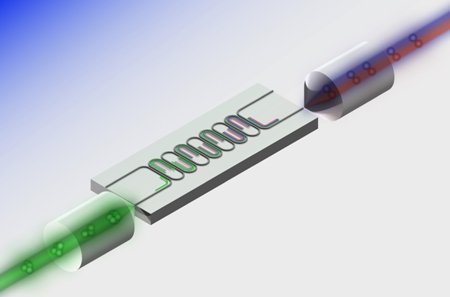Scientists from the National Institute of Standards and Technology (NIST), the Politecnico di Milano, and the University of California (UC), San Diego, have shown the first heralded single photon source generated from silicon, a significant step towards the realization of more realistic quantum information processing.
 Illustration of the process of photon pair generation, in which input pump photons spontaneously generate special pairs of new photons that emerge at precisely the same time, with one at a slightly lower frequency and the other a slightly higher frequency, after which heralding occurs.
Illustration of the process of photon pair generation, in which input pump photons spontaneously generate special pairs of new photons that emerge at precisely the same time, with one at a slightly lower frequency and the other a slightly higher frequency, after which heralding occurs.
This single photon source supplements the two newly devised silicon-based technologies – interferometers that manipulate photon entanglement and single photon detectors required to create a quantum optical circuit or quantum communication system.
Kartik Srinivasan, a NIST scientist, informed that new 0.5x 0.05 mm-sized heralded photon generator integrates with current technology in three crucial ways: since it is made from silicon, it can be fabricated utilizing typical, scalable production techniques; it generates photons that are compatible with present telecommunications systems (wavelengths of around 1550 nm); and it works at room temperature.
A ‘heralded’ photon is one of the two photons whose presence can be known through the identification of its partner called the ‘herald’ photon. The researchers used photon pair generation to produce the heralded single photons. Photon pair generation involves the pumping of photons by a laser into a material whose properties enable two incoming pump photons to create new two frequency-shifted photons spontaneously. Conversely, it is not possible to detect the occurrence of the event because the new pair of photons comes out at the same time.
Srinivasan informed that the detection of one of these photons informs the researchers to seek its partner. Heralded pairs will be useful in activating the storage of data in future quantum-based computer memories. The research team’s silicon-based device effectively generated pairs of single photons. The team also experimentally demonstrated its ability to herald the existence of one photon through the determination of the other.
Shayan Mookherjea, a professor at UC San Diego, stated that the new device is not yet ready for practical applications because a single source does not have sufficient brightness. Hence, the chip needs to be integrated with more sources and their corresponding components for practical applications.